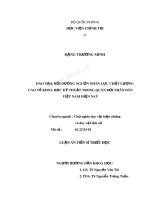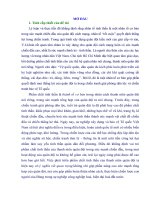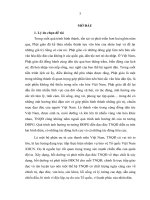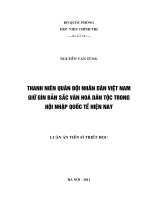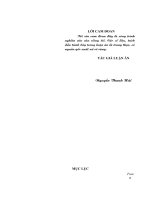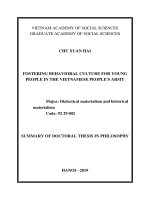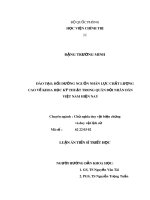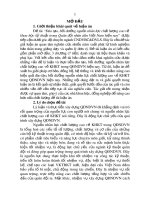Bồi dưỡng văn hóa ứng xử cho thanh niên quân đội nhân dân việt nam hiện nay tt tiếng anh
Bạn đang xem bản rút gọn của tài liệu. Xem và tải ngay bản đầy đủ của tài liệu tại đây (407.6 KB, 27 trang )
VIETNAM ACADEMY OF SOCIAL SCIENCES
GRADUATE ACADEMY OF SOCIAL SCIENCES
CHU XUAN HAI
FOSTERING BEHAVIORAL CULTURE FOR YOUNG
PEOPLE IN THE VIETNAMESE PEOPLE'S ARMY
Major: Dialectical materialism and historical
materialism
Code: 92 29 002
SUMMARY OF DOCTORAL THESIS IN PHILOSOPHY
HANOI - 2019
This research is conducted in:
GRADUATE ACADEMY OF SOCIAL SCIENCES
Supervisors::
1. Assoc. Prof. Dr. Phung Van Thiet
2. Dr. Dao Huy Tin
Reviewer 1: Assoc. Prof. Dr.Le Van Cuong
Reviewer 2: Doctors, Prof.Dr Nguyen Van Huyen
Reviewer 3: Assoc. Prof. Dr. Nguyen Trong Tuan
This thesis shall be under defensed before the Thesis
Examination Board at the academy level, at Graduate Academy
of Social Sciences
At
hour minute, date
month
201..
This thesis is available in Library:
- National Library of Vietnam
- Library of Graduate Academy of Social Sciences
1
INTRODUCTION
1. Necessity of the topic
Behavioral culture is an aspect of culture, it reflects the
way of life of people and the level of civilization of a country, a
nation, the aspiration of people reaching out to the true – the
good – the beautiful values. Cultural behavior not only creates
beauty for each individual, but also reflects the cultural identity of a
community, country, and nation.
As a part of the society, youths of the Vietnamese
People's Army is the most crowded force, they directly perform
the function of fighting, production and work in the army. When
performing their tasks, they must deal with and solve many
complicated and specific relationships. Over 74 years of
construction and growth, youths of the Vietnamese People's
Army has contributed to creating a unique behavioral culture the behavioral culture of the "Uncle Ho's soldiers" with core
values and standards: "Loyal to the Party, fond of people, ready
to fight, sacrifice for independence, freedom of the Fatherland,
for socialism". Every task is completed, every difficulty is
overcome, every enemy is defeated”. These norms and values
play an orientation role, and are the driving force for the
generations of our young people to constantly strive, improve
and perfect the personality, successfully implement all assigned
tasks.
2
Currently, before the impact of the market economy,
international integration, especially the strong development of
mass media makes the behavioral culture of society in general
and youths of the Vietnamese People's Army in particular have
fluctuations in two directions in a positive and negative way. On
the one hand, the core values in the behavioral culture of young
people in the Vietnamese People's Army continue to be
promoted and supplemented with new contents and developed in
accordance with new conditions. Attitudes and behaviors of most
young people in the army are in accordance with orders, sociocultural norms, military culture, it arouses and promotes the
cultural traditions of the nation, army and units. On the other
hand, the impact of the reverse of the market economy, the
negative social phenomena, the resistance of hostile forces and
the limited level of awareness, some young people of the
Vietnamese People's Army had wong actions. They have the
attitude and behaviors that lack standards in communication and
living ... causing loss of solidarity, sense of responsibility in
training and working, even violating the laws of the State and
disciplines of the army ... These expressions have hindered the
development, perfection of the personality, deteriorating the
image of "Uncle Ho's soldiers", adversely affecting the quality of
building strong units and army.
That requires to strengthen to foster the behavioral
culture for for young people in the Vietnamese People's Army to
3
meet the requirements and tasks of building and defending the
Socialist Republic of Vietnam, building revolutionary, regular,
elite and modern army. The maturity of the behavioral culture
of young people in the Vietnamese People's Army undergone a
complex process, influenced by many factors, in which
education and fostering in grassroots units play a leading role.
In general, the fostering of behavioral culture for for young
people in the Vietnamese People's Army has been very
concerned by leaders and commanders of units over the years.
The content and measures of fostering are determined in
accordance with each subject. At the same time, each person
has brought into play the positive and self-awareness in
cultivation and training to create a development of behavioral
culture. However, the quality and efficiency of fostering
behavioral culture for young people in the military force in
comparison with requirements and tasks in the new situation
still face limitations and inadequacies in both awareness and
implementation.
Some
committees,
agencies,
political
commissars and commanders have not paid due attention, lack of
positivity, activeness and creativity in innovating the content,
methods and forms of fostering behavioral culture for young
people. Besides, some young people are not really active in selflearning and self-training to improve their behavioral culture.
Therefore, fostering behavioral culture for young people
in the Vietnamese People's Army to meet the task requirements is
4
both a basic and urgent issue that needs to be realized and
implemented on a scientific and practical basis. Concerning this
issue, there have been many research projects that clarified the
theory and practice, but so far no project has been studied in
depth from a basically and systematically philosophical
perspective of fostering behavioral culture for young people in
the Vietnamese People's Army.
Therefore, the author selected the issue of "Fostering
behavioral culture for young people in the Vietnamese People's
Army" as his/her research topic.
2. Purposes and research tasks of the thesis
2.1. Purposes
Approaching in the philosophical aspect, the thesis
clarifies the theoretical and practical issues of fostering behavioral
culture for young people in the Vietnamese People's Army;
pointing out requirements and proposing basic solutions to
supplement, strengthen and develop the behavioral culture for
young people in the Vietnamese People's Army to meet
requirements of building revolutionary, formal, elite and modern
army.
2.2. Tasks
From a philosophical perspective, the thesis presents a
number of theoretical issues about behavioral culture and
fostering behavioral culture for young people in the
Vietnamese People's Army
5
Analyze, assess the situation and clarify the requirements of
fostering behavioral culture for young people in the Vietnamese
People's Army in the current situation.
Propose basic solutions to supplement, consolidate and
develop the behavioral culture for young people in the Vietnamese
People's Army.
3. Object and scope of the thesis
3.1. Objects
Fostering behavioral culture for young people in the
Vietnamese People's Army as a historical social activity in
order to build and develop the behavioral culture of the
military
3.2. Research scope
Fostering behavioral culture for young people in the
Vietnamese People's Army is a broad issue that involves many
sciences. Within the scope of the thesis, the author focuses on
studying the behavioral culture of young people in the
Vietnamese People's Army and fostering behavioral culture of
young people in the Vietnamese People's Army in the reality of
military activities in the perspective of dialectical materialism
and historical materialism...
Scope of survey: through the annual review and evaluation
reports of the Military Youth Committee, agencies and units and
through actual surveys in a number of units and military schools in
the Northern region from 2010 to present.
6
4. Theoretical and practical basis and research
methods of the thesis
4.1. Theoretical and practical basis
Theoretical basis of the thesis is the system of views of
Marxism-Leninism, Ho Chi Minh's thought, the lines and views
of the Party, State, Central Military Commission, Ministry of
Defense and General Department of Politics on culture,
development and construction of cultural life. At the same time,
the thesis also inherits the research results of the groups and
individuals inside and outside the military on issues related to
the topic.
The main practical basis of the thesis is the actual
situation of fostering behavioral culture for young people in the
Vietnamese People's Army from 2010 up to now, through the
reports on summarizing and evaluating of the Military Youth
Committee and agencies, unit; combined with the processing and
selection of the results of the check and actual survey of the
author in a number of units and military schools in the Northern
region.
4.2. Research methods
The thesis uses the methodology of the dialectical
materialism and historical materialism; in addition, the thesis
incorporates interdisciplinary methods such as: system structure,
analysis
and
synthesis,
logic
and
history,
7
systematization, generalization. In addition, the thesis uses
sociological survey methods in a number of units and military
schools in the Northern region and requests expert advice.
5. New contributions in the scientific aspect of the
thesis
On the basis of research and systematic and clear
presentation of the issue of fostering behavioral culture for
young people in the Vietnamese People's Army in military
activities. The thesis contributes more in terms of theory and
practice of building and developing the behavioral culture for
young people in the Vietnamese People's Army to meet the
requirements and tasks in the current situation.
6. The theoretical and practical significance of the
thesis
The research results of the thesis provide more scientific,
practical and theoretical basis for raising the awareness of
subjects on fostering behavioral culture for young people in the
Vietnamese People's Army; for the determination of contents and
measures to foster the behavioral culture for young people in the
Vietnamese People's Army of leaders and commanders of units;
for contributing to improving the efficiency of fostering
cultural behavior and level of behavioral culture of young
people to meet the requirements and tasks in the new situation.
The thesis can be used as reference in scientific research
and political, cultural and ethical education in military units.
8
7. Structure of the thesis
In addition to the introduction, conclusion and list of
references and appendices, the thesis content consists of 4 chapters
and 11 periods.
Chapter 1
OVERVIEW OF RESEARCH TOPICS
Behavioral culture and fostering behavioral culture for
young people in the Vietnamese People's Army are much
interested in research and interpretation in many different
perspectives.
Studies of military culture and culture
Studies on behavioral culture and behavioral culture of the
Vietnamese People's Army
The basic results and issues that the thesis needs to continue
to solve
However, no project has been approached from a
philosophical perspective, or in-depth research in a basic and
systematic way on fostering behavioral culture for young
people in the Vietnamese People's Army, while this issue needs
to be clarified both in terms of theory and practice. That's why
“Fostering behavioral culture for young people in the
Vietnamese People's Army today” under a philosophical
perspective is a matter of practical significance, contributing to
building the "Revolutionary, regular, elite and modern" army in
the current period.
9
Chapter 2
SOME THEORETICAL ISSUES ABOUT FOSTERING
BEHAVIORAL CULTURE FOR YOUNG PEOPLE IN
THE VIETNAMESE PEOPLE’S ARMY
2.1. Behavioral culture for young people in the
Vietnamese People’s Army
2.1.1. Concept of behavioral culture
As presented in the overview, like culture in general, the
concept of behavioral culture has a multitude of different
approaches and definitions. However, until now, when
discussing behavioral culture, researchers agree on the
following basic aspects.
First, in essence, behavioral culture is a unique feature
of humanity, reflecting and expressing the nature and level of
people in the historical-natural process of humanity. In terms of
behavioral culture, it is a combination of culture and behavior.
Culture means beauty, value, culture that expresses the
aspirations to live of human towards Truthfulness-HonestyBeauty. Therefore, culture with its true meaning is a conscious
mode of human activity, a system of material and spiritual
values created by human, in which "the system of viewpoints,
ideologies, arguments, politics, laws, ethics, aesthetics, religion
and philosophy plays a coherent role, orienting the cultural
circles. ”
10
Behavior, in a broad sense, is the reaction of people to
the impact of externalities (nature, society and surrounding
people). Behavior is a reaction that selects and calculates on the
basis of knowledge, experience, living experience and
personality of each person in order to achieve the highest
results in communication. Thus, behavior is the living attitude.
That attitude was formed and developed in the intentional
receptive process - observation, receipt and brood.
Behavioral culture is the reaction of a subject to the
impact of another subject or an object in a certain way, in order
to achieve the best result. In which, "culture" and "behavior"
are closely intertwined. Culture is the foundation and, at the
same time being expressed through behavior, and behavior is a
requirement and, at the same time, a mode of existence of
culture.
Second, on the nature and level of expression,
behavioral culture is the aspect of culture - it is culture
expressed in communication by actual action.
From the above analysis, it can be conveived that:
Behavioral culture is an aspect of culture, reflecting
and expressing the standard level and nature in people's
attitudes and behaviors (human community) within the impacts
of nature and society in specified historical stages and
circumstances.
11
As an aspect of culture in general, behavioral culture is
full of cultural characteristics. The dominant feature, the core
characteristic of behavioral culture is the standard of attitudes
and behaviors of people in dealing with "responding" and
"treating" relations to the impact of nature and society.
Behavioral culture includes "culture", "behavior" and the
indispensable, intrinsic relationships between them.
The first element that constitutes behavioral culture is
the behavioral knowledge of human according to a system of
cultural values. In terms of social aspects, it is gathering,
synthesis and integration of the beauty of human’s attitude,
behavior treating people and issues in social relationship.
The second element that constitutes behavioral culture
is the behavioral attitude of human with (following) culture.
Attitude is both a constituent element and a basic attribute of
behavioral culture. In essence, the behavioral attitude with
cultural is a mental and psychological state reflecting and
expressing the positiveness in awareness, emotion, feeling of
people and the community of people towards partners during
communication.
The third element that constitutes the behavioral culture
is the behavior of people and communities according to a
certain cultural value system. In essence, the behavior with
(following) culture is a chain of human actions in treating
12
people, issues and it directly expresses their behavior in
communication.
2.1.2. Behavioral culture for young people in the
Vietnamese People’s Army
As a typical object, "young pople" operating in a
specific field, "military activity field", need to format the
behavioral culture for young people in the Vietnamese People’s
Army with their own characteristics, allowing relative
segregation of behavioral culture of this object.
Accordingly, we can conceive: the behavioral culture
for young people in the Vietnamese People’s Army is an aspect
of behavioral culture, reflecting the specificity of the system of
standard values as well as the attitude and behavior of young
people in the military, in accordance with the requirements of
military operations in different historical periods.
The above notion shows that the behavioral culture of
young people in the Vietnam People's Army has a common
point, unified with the behavioral culture of Vietnamese young
people, and its specific characteristics of the requirements of
the field and the operating environment. That peculiarity is
expressed in the following basic characteristics:
The first characteristic, the standard value system of
the behavioral culture of young people in the Vietnam People's
Army is the Vietnamese military culture system, which is at the
core of the culture of "Uncle Ho's soldiers".
13
The second characteristic, the way of expressing the
behavioral culture of young people in the Vietnam People’s
Army
is
self-discipline
and
strictness
according
to
predetermined rules.
The third characteristic, the behavioral culture of
young people in Vietnamese People’s Army has a high demand
for attitude and communication.
2.1.3. Expression of behavioral culture for young
people in the Vietnamese People’s Army
The behavioral culture of young people in the Vietnam
People's Army is expressed in the knowledge, attitudes and
behaviors of military personnel in practical activities.
The knowledge of behavioral culture of young people in
the Vietnam People's Army is their basic understanding of
Marxism-Leninism, Ho Chi Minh’s thought, morality and style;
the Party's views, lines and undertakings; policies and laws of
the state; The Vietnam People's Army’s glorious, heroic
tradition
The behavioral attitudes of young people in the
Vietnamese People's Army is their willingness in terms of
thoughts, feelings, beliefs, their choices to react to situations in
their tasks, lives and behaviors to successfully solve those
situations.
The behaviors of behavioral behavior of young people
in the Vietnamese People’s Army is a high level of self-
14
discipline in implementing a code of conduct in military
activities. It is expressed in their response, their behavior
according to the political objectives, cultural norms of state
law, military discipline, voluntarily, unanimously, without
criticism
Behavioral culture for young people in the Vietnamese
People’s Army is expressed in their practical activities, in
speech and behavioral attitude.
2.2. The nature of fostering behavioral culture for
young people in the Vietnamese People’s Army
2.2.1 Concept of fostering behavioral culture for
young people in the Vietnamese People’s Army
Young people in the Vietnamese People's Army is
conceived as young people in the army, aged from 18 to 30.
They are officers and professional soldiers of the age of the
Youth Union and the entire non-commissioned officers. Young
people in the Army is the core force, the majority force of the
Vietnam People's Army. They are the ones who directly
perform military tasks in the grassroots units, according to the
function of "Combat armies, working troops and production
labor army". In units with enough troops, they accounted for
more than 80% of the army; at company level, most officers
and soldiers are at the young age; 21.45% of officers, 32.49%
of party members, 30% of workers and civil servants, defense
labors are in young ages.
15
As young people in the army, the experience is not
much, so they are often not really mature and stable; lack of
patience; often easily subjective to victory, pessimistic,
depressed when encountering difficulties, temporary failures;
the ability to discriminate right - wrong, good - bad... is limited,
the ability of self-control is poor, often rigid, inflexible in
handling complex situations. Since then, it can be affirmed that
the behavioral culture for young people in the Vietnamese
People’s Army has been formed and developing, and must
continue to be fostered for improvement.
Fostering is a social activity aimed at improving,
supplementing, compensating for weaknesses and shortcomings
to meet their needs. Therefore, it can be understood that
fostering is a process of conscious impact in order to increase
certain aspects of people to meet their requirements and tasks.
In real life, fostering activities are very diverse. Fostering
behavioral culture for young people in the Vietnamese People’s
Army is a side of general training.
Thus, it can be conceived: Fostering the behavioral
culture for young people in the Vietnamese People’s Army is
the whole of conscious and purposeful impacts of the subject in
a voluntary way to supplement, consolidate and improve
knowledge, attitude and behavior level of young people in the
Vietnamese People’s Army in order to meet the objectives of
16
requirement of military activities in each certain historical
period.
The purpose of fostering the behavioral culture for
young people in the Vietnamese People’s Army is the overall
self-consious impact according to the development rules of the
subject's culture in order to supplement the missing ones;
reinforce the unstable, immature and imperfect elements of
cultural knowledge, attitudes and behaviors to meet the
requirements of military activities.
In essence, fostering the behavioral culture for young
people in the Vietnamese People’s Army is the process of
transforming the standard of cultural behavioral culture of
society and the military field into cultural knowledge, attitudes
and behavior of young people in the revolutionary, regular
army youth. In fact, activities of fostering behavioral culture of
young people in the Vietnamese People’s Army are a process
of positive, voluntary, dynamic and creative impacts of
subjects. With many ways of organizing different impacts,
closely linked with each other, based on the correct awareness
of the general rules and specific characteristics of the
formation, behavioral culture for young people in the
Vietnamese People’s Army is developed.
Objects of fostering the behavioral culture for young
people in the Vietnamese People’s Army: their cultural
17
knowledge, attitudes and behaviors in the military field, in
military activities and in social relationship.
The subject of fostering the behavioral culture for
young people in the Vietnamese People’s Army, firstly, is the
organization of leaders and commanders at all levels, agencies,
themselves and mass organizations.
Contents, forms and methods of fostering behavioral
culture for young people in the Vietnamese People’s Army
In term of content, supplement and reinforce knowledge
level and ability to properly and creatively apply the theory of
Marxism-Leninism, Ho Chi Minh's thought, the Communist
Party's view of culture, ethics, aesthetics; the values, norms of
traditional behavioral culture of the nation, cultural norms of
"The Uncle Ho's soldiers".
Supplement, strengthen and perfect the knowledge about
behavioral culture and the sense of self-awareness in
implementing behavioral culture.
Supplement, reinforce and perfect them with knowledge of
the law of the Socialist Republic of Vietnam, the honorary oath
of military personnel, the order of the Vietnamese People's
Army, knowledge of social morality in general, military
morality in particular, the provisions of the unit; att the same
time, train the formal style, the ritual, the military manners in
daily activities, in handling relationships and in performing
tasks.
18
In terms of methods and forms, fostering behavioral
culture for young people in the Vietnamese People’s Army is
carried out abundantly and flexibly through educational
activities, self-education; through organization, management
and organization of their activities; through means of
propaganda.
2.2.2. Factors affecting to fostering behavioral culture
for young people in the Vietnamese People’s Army
Fostering behavioral culture for young people in the
Vietnamese People’s Army is an overview of the ways in
which the measures of activity comply with the rules of the
subjects. Thus, fostering the behavioral culture for young
people in the Vietnamese People’s Army is the overall impact
of the subject having the object and purpose according to the
development law of culture and under the impact of the
following factors:
Fostering behavioral culture for young people in the
Vietnamese People’s Army is under the direct impact of the
education and self-education processes in the military.
Fostering behavioral culture for young people in the
Vietnamese People’s Army is affected by the level of
knowledge, experience, living experience, cognitive capacity
and capacity to actualize their behavioral culture.
19
Fostering behavioral culture for young people in the
Vietnamese People’s Army is subject to the conditions of
specific military environment.
Chapter 3
THE CURRENT SITUATION AND REQUIREMENTS
SET IN FOSTERING BEHAVIORAL CULTURE FOR
YOUNG PEOPLE IN THE VIETNAMESE PEOPLE’S
ARMY TODAY
3.1. Current situation of fostering behavioral culture
for young people in the Vietnamese People's Army today
Based on the research results in both theory and
practice, the topic generalizes the advantages, limitations and
causes of advantages and limitations in fostering behavioral
culture for young people in the Vietnamese People’s Army in
agencies and units today as follows:
Advantages
Most of the subjects have been quite aware of the
behavioral culture and fostering behavioral culture for young
people in the Vietnamese People’s Army to improve the quality
of "revolutionary, formal, elite and modern step by step"
military construction.
Regarding the content, forms and measures of fostering
behavioral culture for young people in the Vietnamese People’s
Army in the agencies and units, it is relatively close to the
requirements and tasks of the Army and the practice.
20
Most of young people in the Vietnamese People’s Army
have the right motive, high responsibility in studying,
cultivating and practicing behavioral culture. Most of them
have good personality, worthy of "Uncle Ho's soldiers".
Limitations
In addition to the efforts and achievements, the behavioral
culture and fostering the behavioral culture for young people in
the Vietnamese People’s Army also reveals certain limitations.
Those limitations are reflected in the following contents:
Some subjects have not been properly aware of the
position, role and meaning of activities of fostering the
behavioral culture for young people in the Vietnamese People’s
Army.
The content, forms and methods of fostering the
behavioral culture for young people in the Vietnamese People’s
Army are sometimes very cliché, not really suitable.
In the face of the impact of the environment, a part of
young people in the Vietnamese People’s Army also exhibited
standard deviations in behavioral culture. They are lacking of
responsibility at work, resigning duty; not dealing with
comrades in proper manner; having not yet raised the spirit of
self-cultivation and training. Some recent years, there has been
the phenomenon of young people in the Vietnamese People’s
Army violating discipline and even violating the law.
21
3.2. The requirements set forth in fostering
behavioral culture for young people in the Vietnamese
People’s Army today
From the reality of fostering behavioral culture for
young people in the Vietnamese People’s Army in recent years,
the subjects need to be deeply aware and resolve the following
requirements:
Firstly, fostering the behavioral culture for young
people in the Vietnamese People’s Army today must promote
the role of the subjects.
Secondly, fostering the behavioral culture for young
people in the Vietnamese People’s Army today must develop
comprehensively the elements of behavioral culture, especially
taking serious consideration of fostering, training cultural
attitudes, behaviors.
Thirdly, fostering behavioral culture for young people
in the Vietnamese People’s Army must be associated with
building a healthy military cultural environment.
Chapter 4
BASIC SOLUTION IN FOSTERING BEHAVIORAL
CULTURE FOR YOUNG PEOPLE IN THE
VIETNAMESE PEOPLE’S ARMY TODAY
22
4.1. Promote the role and responsibility of the subjects
in fostering behavioral culture for young people in the
Vietnamese People’s Army today.
4.2. Continue to innovate the content, forms and methods of
fostering behavioral culture for young people in the Vietnamese
People’s Army today.
4.3. Build a healthy military cultural environment at the
base unit of the Vietnamese People's Army.
23
CONCLUSION
Fostering the behavioral culture for young people in the
Vietnamese People’s Army today is an important activity to
build and develop the personality of military personnel.
Fostering the behavioral culture for young people in the
Vietnamese People’s Army is a conscious and purposeful
process of self-sufficiency of the subject in order to
supplement, strengthen and develop behavioral knowledge,
attitudes and behaviors of young people in the Vietnamese
People’s Army in dealing with relationship with duties and
surrounding people according to cultural values and norms that
meet the requirements of military operations. The behavioral
culture of young people in the Vietnamese People’s Army is
completed in a complex process, under the influence of many
factors, in which the process of education and fostering is a
direct and major process. This process is always associated
with certain subjects and objects, associated with a defined
space and environment, in a mutually dialectical relationship.
Fostering the behavioral culture for young people in the
Vietnamese People’s Army today also reveals certain
limitations, they are: the activeness and initiative in fostering
the behavioral culture for young people in the Vietnamese
People’s Army today in some subjects are limited; content,
form, method are still cliché, not really appropriate; a part of
young people in the Vietnamese People's Army do not have the
